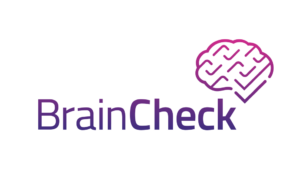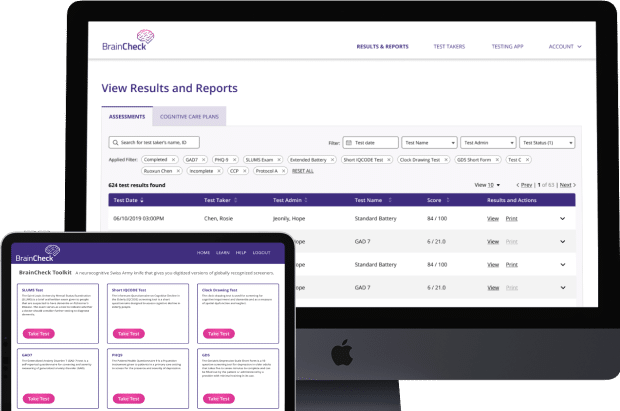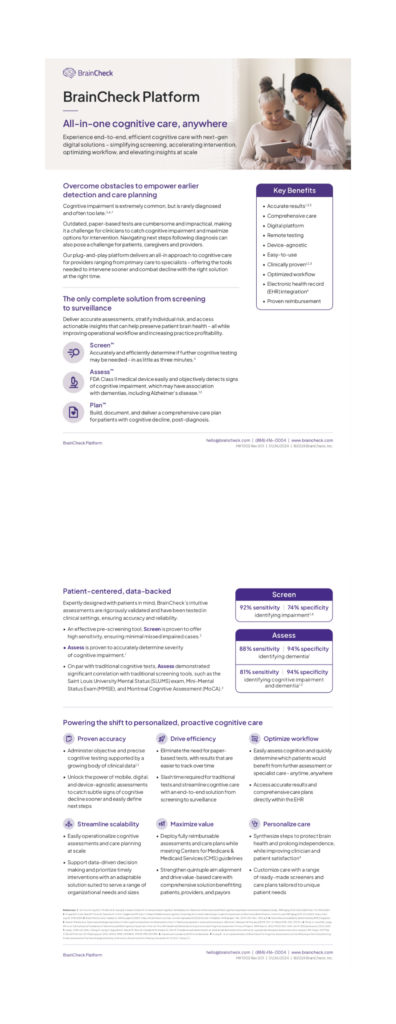Once you’ve added a cognitive assessment platform to your practice, the next step is deciding which patients and circumstances provide reasons for cognitive testing. So, how can you know when to order cognitive testing? First, we have to define the difference between cognitive screening and cognitive testing.
Cognitive screening – or cognitive testing?
Cognitive screening is an appropriate choice for seniors, and it’s encouraged in Medicare Annual Wellness Visits. Initiating cognitive testing, however, requires a clinical decision — a higher threshold than screening.
Also, the American Academy of Neurology’s guidelines for mild cognitive impairment (MCI) recommend use of validated tools for assessment. As a validated assessment platform, BrainCheck helps physicians and neurologists objectively evaluate cognition.
Fortunately, various Medicare guidelines detail a number of scenarios in which testing is appropriate when coded and documented.
Rationale: Subjective Complaints
Subjective complaints from a patient concerning difficulty with memory, thinking, attention, and more offer a clear reason to order cognitive testing. These difficulties, like getting lost while driving on familiar roads, repeatedly losing common items in the home, or asking the same questions over and over, may indicate cognitive impairment.
It is not unusual for an individual to deny any concern — but physicians can also hear of problems from family members. Providing an independent, quantitative assessment of cognition is important, especially since research indicates individuals are often poor judges of their own cognitive health.
Rationale: Diagnosis
Confirming or establishing a diagnosis with the aid of formal cognitive testing is another common rationale. Cognitive assessment — in conjunction with history, examination, and other diagnostics — can assist in the diagnosis of dementia or other central nervous system (CNS) illnesses.
Also, diagnosis of a CNS illness, such as stroke, may already be established. In those cases, cognitive testing is appropriate to understand the neurocognitive effects of the illness.
Cognitive testing is also appropriate and valuable in differential diagnosis of psychogenic versus neurogenic syndromes. For example, highly anxious individuals can overreact to benign, age-related changes in cognition, believing they are experiencing dementia symptoms. Formal testing can establish current functioning, as well as provide reassurance to such patients.
Rationale: Tracking Progression and Improvement
Once a diagnosis is established, repeat cognitive testing over time can be useful in establishing disease progression and prognosis. And sometimes you’ll assess not for progression, but improvement.
Response to treatment — whether starting a new medication or de-prescribing — can be tracked with sequential cognitive testing. Examples could include tracking improvements following prescription of a cognitive enhancer for mild cognitive impairment (MCI), vigorous treatment of geriatric depression, or de-prescribing anti-cholinergic or overly-sedating medications.
Documentation, Billing, and Coding
Clearly stating the rationale for providing cognitive testing in the patient’s medical record is essential for compliant billing and coding. Additionally, documenting your review of relevant history, your interpretation of test results, and any resulting changes in the treatment plan demonstrates the medical decision-making that supports the use of cognitive testing codes.
For additional support as you incorporate a cognitive assessment platform into your practice, BrainCheck has a variety of resources available to help clinicians navigate the coding, billing, and documentation requirements of cognitive testing.



